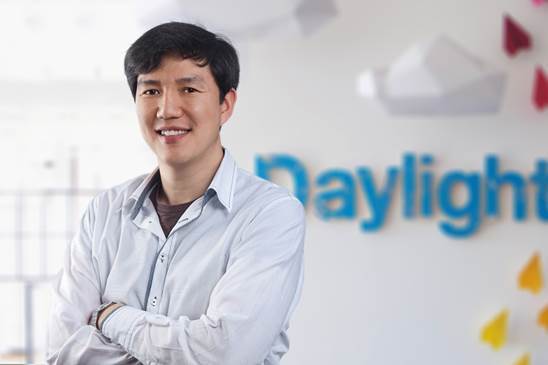Designers should be more than a beautifier, but a person who makes improvements for the world, said Daniel Kim, principal of Daylight Design.
By following the “design thinking process” to draw out user-based solutions, designers can improve the community, the environment and the world, said Kim, who heads the Asian division of the San Francisco-based design consultancy.
Kim started his career at IDEO, the cradle of “design thinking,” moved on to work for online game developer Nexon America and then joined his former IDEO colleagues at the Daylight Design to overlook projects based in Asia.
The designer will lecture at the Herald Design Forum on Nov. 26 at Dongdaemun Design Plaza in central Seoul, where speakers will discuss the newly discovered influence of design on everyday life under the theme of “Design Spectrum: Expanding the Definition of Design.” Kim said he will talk about designers’ social responsibility at the event that is expected to draw more than 1,000 participants.
“People think designers are those who make you spend money by coming up with new things every day. They think that what designers do is make replaceable, dispensable and aging products. This is just a fraction of what we do,” Kim said in his interview with The Korea Herald.
 |
Daylight Design principal Daniel Kim. (Chung Hee-cho/The Korea Herald) |
“What the designers at Daylight tackle is something broad, maybe overly daring and difficult from time to time. We talk about eradicating child obesity, poverty and even extremism. That’s not something you would expect from designers who sketch products, but we believe we can think of solutions to such intangible problems,” said Kim.
Designers at Daylight, founded by former IDEO workers, have been sparing half of their resources on much less commercial projects to follow the mission. Apart from working for A-list Korean clients, Kim and his colleagues have supported start-up businessmen by joining hands with Spark Lab, a venture accelerator.
Things have already taken off in the U.S., where the designers launched such projects a long time ago. For example, they helped a charity start-up tackle with recidivism among female criminals. The team found out that the main problem for them was the difficulty of landing stable jobs after being released from prison because of the lack of a proper day care center to look after their kids.
They came up with an idea of running day care buses, which pick up the children from the women’s doorstep so that they can head straight to work. The buses, which were converted into mini-kindergartens, keep the children safe and entertained while riding around the neighborhood, Kim said.
“The funny thing about business ventures is that in many cases, you don’t know whether it is a success or not until you consume all the money. But with design thinking, you are able to build a prototype based on the users’ sentiment and direction. In this way you can reduce the risk from the very start and every step in the middle,” he said.
With many experiences with successful start-ups, Kim noted the need for more support for enterprising firms in the infant stage.
“I am happy to see more and more people recognizing that we need systematic support for start-ups. Starting a business in Korea is a complicated process. In Korea, every piece of liability falls on a single person, which scares aspiring entrepreneurs. In the U.S., however, various systems support venture businesses and people are ready to guide you. I think design thinking could help start-ups tap into their potential with fewer risks,” he said.
By Bae Ji-sook (
baejisook@heraldcorp.com)








![[Today’s K-pop] Blackpink’s Jennie, Lisa invited to Coachella as solo acts](http://res.heraldm.com/phpwas/restmb_idxmake.php?idx=644&simg=/content/image/2024/11/21/20241121050099_0.jpg)